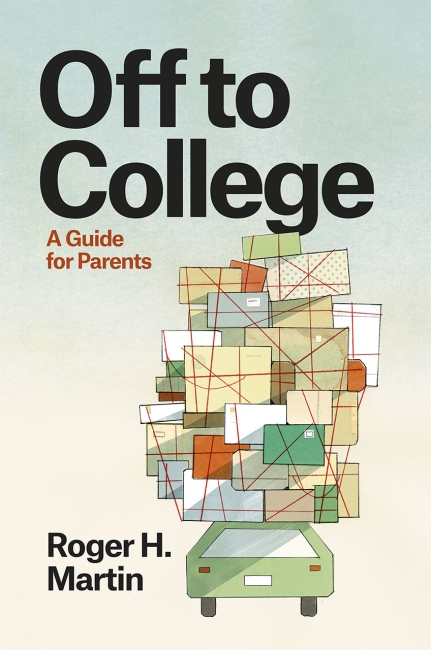You have /5 articles left.
Sign up for a free account or log in.

University of Chicago Press
As the start of the academic year approaches, parents of incoming freshmen wonder what they should be doing to prepare their children. Roger H. Martin, former president of Moravian College in Pennsylvania and Randolph-Macon College in Virginia, and a parent of two daughters who both attended college, spent a year examining the programming and resources offered to first-year students at five different four-year institutions -- Tufts University, Vassar College, Morningside College in Iowa, Washington College in Maryland and Queens College of the City University of New York. From orientation sessions to campus safety to first-generation students, Martin examines the freshman year of college from multiple lenses, dispensing advice to parents along the way. Martin answered questions about his new book from the University of Chicago Press, Off to College: A Guide for Parents, via email.
Q: Helicoptering, overinvolvement and underinvolvement of parents with their first-year students all come up as scenarios in the book. As both a parent and a former college administrator, how involved do you believe a parent should be?
A: Parents should love and support their children and be there for them in the event of a crisis but otherwise let their children take care of their own business. What I mean by this is that when their child has a roommate problem, or is not getting proper advising, or is not getting field time on the baseball team, the child -- not the parent -- should talk to the appropriate dean or coach. Part of a college education, beginning first year, is learning how to be independent, and this will not happen if parents are constantly intervening for their children.
Q: As you examined programming and other resources for first-year students, what stood out the most to you as a parent? What advice would you give to parents who are concerned about leaving their children at college for the first time, and do you think the children would agree?
A: What stood out to me most is that good colleges will not abandon their students when things go wrong, that when a child is struggling with a learning disability (as I did), or is having writing issues, or is depressed, there are people on campus who will help out. So the advice I would give parents who are concerned about leaving their children at college is that they need to calm down (or chill, in the common parlance), that at most good colleges and universities their children will be well taken care of.
Most first-year students will agree, saying that they want their parents to be supportive but otherwise not to interfere. Unfortunately, I’m increasingly meeting college students who still want their parents to run interference for them, and this is not good.
Q: You also take on the difficulties of financing a college education. What would you say to parents who are afraid of paying a great deal for college only to find that their child isn’t succeeding? How would you suggest they minimize financial pressures during freshmen year?
A: In both of my colleges, I saw first-year students who clearly didn’t know why they were there, cut classes and ended up doing poorly or flunking out. If Thanksgiving rolls around and things are not going well academically, this would be a good time for parents to have a frank conversation with their child. If the interest is still there but the grades aren’t, parents should urge their student to sit down with his or her adviser and work out a plan to succeed. Perhaps a lighter course load might help. Perhaps their student needs to spend more time with studies, less time partying. But if their child just isn’t interested in college, there is nothing wrong (indeed, everything right) with temporarily leaving college and serving one’s country in the armed services or with AmeriCorps or by learning a trade and getting a job. If the interest resurfaces later on, college can resume.
There are many ways to help minimize financial pressures first year. For example, before they leave for college, parents should insist that their child manage and stick to a budget and responsibly use a credit card (sometimes a debit card works better). Their child should also consider taking on a campus job to help pay for college. Some parents think that working will detract from academics, but studies show that college students who work 20 hours per week or less actually do better academically than students who don’t work at all. Students who work are also less likely to drop out of college and, of course, having a campus job is something they can put on their résumé. I suggest other strategies for minimizing financial pressures in the book.
Q: Throughout the book, you look at programs at all different kinds of four-year institutions. Despite all of the unique features in each first-year experience, did you find a theme or focus that was present in each of those programs? Do you think all other institutions should adapt to make sure that their programs also have this theme or focus?
A: First-year programs at the institutions I studied in Off to College all had similarities, even though the institutions themselves are in many ways very different. They did not overuse adjuncts or graduate students to teach first-year students, as is often the case in larger universities. They considered good advising to be a critical ingredient to college success. Classes -- even for first-year students -- tended to be much smaller than the large lectures we often hear about. And what we call “active learning” -- learning in which students are not passive listeners but are actively engaged in the learning process -- defined the curriculum. All of these institutions also took great care to monitor their first-year students from the day they arrived at orientation and to quickly intervene if problems (like missing classes or not engaging in out of-classroom activities) became apparent. Colleges that do not do these things risk severe attrition problems.
Q: You dedicated to the book to your daughters, and say you hope they “will benefit from this book when my grandchildren head off to college.” You also mention multiple times how orientations and first-year programs have features you didn’t have access to as a freshman. How do you think the first-year experience will change in the future?
A: I think higher education is changing, and with this change so will the first-year experience. When I went to college in the 1960s, for example, very few campuses had disability support services, and I suffered as a result. Today, most colleges offer support for students with physical and learning disabilities. In the past, higher education, especially at the more elite colleges and universities, was available mostly to white upper- and middle-class students. Today, colleges and universities are much more racially and economically diverse, and, as a result, much stronger.
Technology is playing a larger role in higher education, and I think that as this happens, the first year will also change -- hopefully for the better. I do not think, however (as some do), that technology can completely replace real professors teaching students in a campus setting. Education is a very human activity, and the thought of eighteen-year-olds receiving their college education over the Internet in the comfort of their parents’ living room is, frankly, scary. As I point out in my book, college is not just about academics; it’s also about living in a residence hall with someone who is very different, playing a sport and writing for the college newspaper. So my hope is that while college (including the first-year experience) will inevitably change, many important things will remain pretty much as they have always been.
Q: You've also recently spent time as a first-year student for your book Racing Odysseus: A College President Becomes a Freshman Again. From your experience with that, and in researching this book, what do you think is the number-one issue for first-year students that both parents and institutions should be aware of?
A: Most people who work with first-year students will agree that the number-one issue for most first-year students is time management. Before college, they lived at home. Mom or Dad woke them up, made them breakfast and then sent them off to school, where the schedule from 8 a.m. to 3 p.m. was invariable. After school and various activities, they ate dinner at a set time, did their homework and then went to bed.
At college they have no one to wake them up in the morning and tell them when to eat breakfast. Classes vary over the week: Some days there are no classes. And then in the evening no one tells them when to eat dinner, when to study and when to go to bed. Most students must learn to do these things by themselves, which, again, is part of the growing-up process and -- to come full circle -- why parents need to chill and stay on the sidelines.








